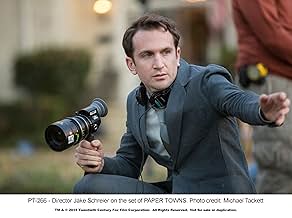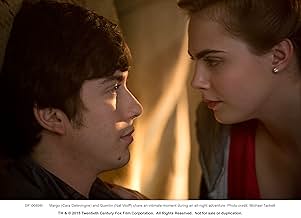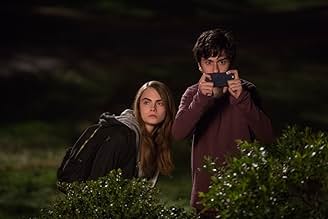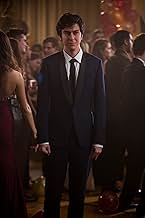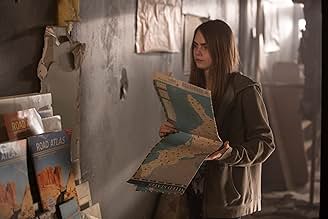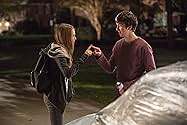IMDb रेटिंग
6.2/10
1.1 लाख
आपकी रेटिंग
अपनी भाषा में प्लॉट जोड़ेंAfter an all-night adventure, Quentin's lifelong crush, Margo, disappears, leaving behind clues that Quentin and his friends follow on the journey of a lifetime.After an all-night adventure, Quentin's lifelong crush, Margo, disappears, leaving behind clues that Quentin and his friends follow on the journey of a lifetime.After an all-night adventure, Quentin's lifelong crush, Margo, disappears, leaving behind clues that Quentin and his friends follow on the journey of a lifetime.
- निर्देशक
- लेखक
- स्टार
- पुरस्कार
- 4 जीत और कुल 3 नामांकन
Hannah Riley
- Young Margo
- (as Hannah Alligood)
फ़ीचर्ड समीक्षाएं
The first twenty minutes absolutely blew me away, totally enjoyable, when she'd disappeared I honestly thought it was going to be a kind of Gone Girl thriller, wrong, it fell somewhere between Road Trip and the Goonies. After adjusting to what essentially became a teenage road trip movie I kind of enjoyed it, there were some entertaining moments. I couldn't help feeling a little bit robbed, it had been set up so well, it literally felt like a different film after her disappearance.
The ending at least was one that decided not to pander to audience satisfaction, a little sour but interesting. As always with this kind of film the usual clichés are there in full, point zero as is the rule is the prom, they always have to be motivated by the prom.
Interesting casting, Nat Wolff was very good as Quentin, he didn't overplay it, very enjoyable. I will applaud the decision to cast Cara as Margo, maybe not the top of many lists but I felt her personality and natural self gave Margo her enigma and mysterious edge, I thought she was very good, the accent slipped to English on a few occasions, but that can be forgiven, I hope it's a springboard for her I like her.
6/10 It was good, it should have been so much more.
The ending at least was one that decided not to pander to audience satisfaction, a little sour but interesting. As always with this kind of film the usual clichés are there in full, point zero as is the rule is the prom, they always have to be motivated by the prom.
Interesting casting, Nat Wolff was very good as Quentin, he didn't overplay it, very enjoyable. I will applaud the decision to cast Cara as Margo, maybe not the top of many lists but I felt her personality and natural self gave Margo her enigma and mysterious edge, I thought she was very good, the accent slipped to English on a few occasions, but that can be forgiven, I hope it's a springboard for her I like her.
6/10 It was good, it should have been so much more.
Coming on the heels of its commercially-successful predecessor, 'The Fault in Our Stars', PAPER TOWNS is no heavy tearjerker, but it echoes more affectionate and piercing sentiments, with its lighter, minimalist take of its recognizable subjects.
The film follows Quentin (Nat Wolff) , or "Q" as he is more popularly called, a highschool boy who has been nursing an unrequited love for the girl living next door, Margo (Cara Delevigne) since childhood. Even after when they turn 12, when Margo suddenly becomes distant, "Q" never loses the affection, and it only becomes even stronger when one day she climbs again to his window, the way she did when they were still kids. The next events follow an eager "Q" savoring the moment as he escorts Margo in her series of "small revenge" against those she thinks have betrayed her, including her ex-boyfriend. But the levitating moment would only last overnight, because the next day, the ever mystifying Margo, disappears.
Mining on the same overly familiar material that dwells on both coming-of-age and teenage romance territories, PAPER TOWNS pulls off two easily-recognizable efforts: maintaining 'The Fault's charm, while toning down its tragic notions. The latter of which, yields a more tangible and heartwarming result, capable of conjuring a lasting tug at the heartstrings. The credit for this goes to its equally-charming yet capable actors, both of whom teeming with fresh and enigmatic likability. It will also sound unforgivable to never pay regard to the film's brilliant screenwriters who manage to cleverly highlight this extremely familiar highschool tale's stronger and more relatable sentiments, genuinely and sincerely enough, to bend fragile emotions with crippling capacity.
"Q"'s road trip in finding Margo represents a bigger journey with far wider scope and meaning, and it comes across as a process of personal exploration that unknowingly liberates one self, toward finding the deeper sense of their existence. Hardly that the questions thrown get resolved, but the charming and sincere take of its proceedings, will ultimately make the narrative arrive to a satisfying conclusion. This doesn't mean it's able to satisfy its own queries, but the resolution delivered are nonetheless, reliable and honest.
PAPER TOWNS will come across as a witty, yet touching case of a 'lost and found'. Much of it is spent in searching for the 'lost', a liberating process that frees its seekers from every question that unfolds in the wake of a previous other, but the 'found', though never really answers any of the previous questions, will deliver a surprisingly satisfying, and never less of a rewarding, answer.
The film follows Quentin (Nat Wolff) , or "Q" as he is more popularly called, a highschool boy who has been nursing an unrequited love for the girl living next door, Margo (Cara Delevigne) since childhood. Even after when they turn 12, when Margo suddenly becomes distant, "Q" never loses the affection, and it only becomes even stronger when one day she climbs again to his window, the way she did when they were still kids. The next events follow an eager "Q" savoring the moment as he escorts Margo in her series of "small revenge" against those she thinks have betrayed her, including her ex-boyfriend. But the levitating moment would only last overnight, because the next day, the ever mystifying Margo, disappears.
Mining on the same overly familiar material that dwells on both coming-of-age and teenage romance territories, PAPER TOWNS pulls off two easily-recognizable efforts: maintaining 'The Fault's charm, while toning down its tragic notions. The latter of which, yields a more tangible and heartwarming result, capable of conjuring a lasting tug at the heartstrings. The credit for this goes to its equally-charming yet capable actors, both of whom teeming with fresh and enigmatic likability. It will also sound unforgivable to never pay regard to the film's brilliant screenwriters who manage to cleverly highlight this extremely familiar highschool tale's stronger and more relatable sentiments, genuinely and sincerely enough, to bend fragile emotions with crippling capacity.
"Q"'s road trip in finding Margo represents a bigger journey with far wider scope and meaning, and it comes across as a process of personal exploration that unknowingly liberates one self, toward finding the deeper sense of their existence. Hardly that the questions thrown get resolved, but the charming and sincere take of its proceedings, will ultimately make the narrative arrive to a satisfying conclusion. This doesn't mean it's able to satisfy its own queries, but the resolution delivered are nonetheless, reliable and honest.
PAPER TOWNS will come across as a witty, yet touching case of a 'lost and found'. Much of it is spent in searching for the 'lost', a liberating process that frees its seekers from every question that unfolds in the wake of a previous other, but the 'found', though never really answers any of the previous questions, will deliver a surprisingly satisfying, and never less of a rewarding, answer.
When reviewing a movie based on a book, should the reviewer make the movie's story part of the commentary, even if the movie's plot matches the book's plot closely? I say yes. And I'll go even further. I don't think it's necessary for the reviewer to read the book before reviewing the movie. Here's why: A movie reviewer reviews movies, not books. A movie has to stand on its own, whether the viewer has read the book or not (and, usually, the majority haven't). Now, if I haven't read the book, after I see the movie, I'll do some background research on the differences between the two so I can include that information in my review, but I'm still only going to judge aspects of the movie as they contribute to the whole. Take the movie "Paper Towns" (PG-13, 1:49) for example. Although I haven't read the book, I have read enough about the book to compare them, but I'm still only judging what appeared on screen.
I say all that to say this: "Live life to the fullest." There. I just saved you almost two hours. That's really all this movie is about. Didn't care for the story. Didn't care for the movie. Still, I do owe you more than that, so, as always, I'll tell you about the actors and the plot (without spoilers), I'll explain the grade I've given the movie, including what I think wasn't good and what was good (because, after all, there's some of both in almost every movie). And whether you think the book was better than the movie or the movie was better than the book is irrelevant. This is a movie review. Ya feel me? Cool. Onward and upward The movie takes its title from the 2008 book by John Green (author of "The Fault in Our Stars"). In the eyes of one of the story's central characters, paper towns are cities in which people ("paper people") go about their hum-drum lives without really living. The title also carries a literal real-world meaning. The title is a reference to the cartographers' practice of putting fake places onto the maps they make to deter copyright infringement (or catch anyone who does such infringing). These plagiarism traps have several names, including paper towns. One such paper town is Agloe (in New York State's Catskill Mountains), which is where the story's climax takes place. But the story begins in Orlando, Florida.
Quentin "Q" Jacobsen (Nat Wolff) fell in love with Margo Roth Spiegelman (model-singer-actress Cara Delevingne) when her family moved in across the street from his. Both kids were in elementary school, but it was love at first sight for him. It was friendship for her and then it wasn't even that. Q and Margo drifted apart. As high school seniors, they don't even acknowledge each other anymore. She's beautiful, free-spirited and mysterious (as she has always been) and hangs out with the other popular kids. Q is socially awkward and the opposite of adventurous and hangs out with his two best friends and fellow band students, Ben Starling (Austin Abrams) and Marcus "Radar" Lincoln (Justice Smith).
The action really starts one night when Margo crawls in through Q's bedroom window and asks to borrow his car to pull revenge pranks on her cheating boyfriend and others whom she feels have betrayed her. Q reluctantly agrees to be her getaway driver, and even helps a bit. Over the course of the night, he admits that he had fun and he begins to hope that this experience will rekindle his dormant friendship with Margo and maybe lead to something more. His hopes are soon dashed when Margo goes missing. Her parents believe that she has run away (for the fifth time), and now that she's 18, they aren't even going to look for her. Both Q and Lacey Pemberton (Halston Sage), Margo's best friend, want to know what happened to Margo, but they haven't a clue yet.
"Margo always loved mysteries," Q tells us in his brief narration at the beginning of the film. "So much that she became one." Margo may be a gone girl, but she left clues, which lead Q, Ben and Radar to search Margo's room, take her bedroom door off its hinges, go to an abandoned building in a shady part of town and, eventually take a long road trip, joined by Radar's girlfriend, Angela (Jaz Sinclair) and Lacey, on whom Ben has a crush (when he's not lusting after Q's mother). Through all this, the film omits some of the episodes in the book (as almost all film adaptations have to do), but keeps all the most important plot points (including the ending), as well as the "moral of the story".
"Paper Towns" has a worthwhile message, but takes as long to get there as driving from Florida to New York. The story's original enough, but it's highly unrealistic. The actors are appealing and the film treats the teens like real people, but they seem abnormally worldly for their ages and their angst sometimes annoyingly plays out as nothing more than (mostly) spoiled rich white kids complaining about their lives. Lastly, after emotionally investing (as much I could) in these characters, as well as almost two hours of my time, I found the ending frustrating. "Paper Towns" is as disappointing as a sightseeing trip to Agloe, New York. "C"
I say all that to say this: "Live life to the fullest." There. I just saved you almost two hours. That's really all this movie is about. Didn't care for the story. Didn't care for the movie. Still, I do owe you more than that, so, as always, I'll tell you about the actors and the plot (without spoilers), I'll explain the grade I've given the movie, including what I think wasn't good and what was good (because, after all, there's some of both in almost every movie). And whether you think the book was better than the movie or the movie was better than the book is irrelevant. This is a movie review. Ya feel me? Cool. Onward and upward The movie takes its title from the 2008 book by John Green (author of "The Fault in Our Stars"). In the eyes of one of the story's central characters, paper towns are cities in which people ("paper people") go about their hum-drum lives without really living. The title also carries a literal real-world meaning. The title is a reference to the cartographers' practice of putting fake places onto the maps they make to deter copyright infringement (or catch anyone who does such infringing). These plagiarism traps have several names, including paper towns. One such paper town is Agloe (in New York State's Catskill Mountains), which is where the story's climax takes place. But the story begins in Orlando, Florida.
Quentin "Q" Jacobsen (Nat Wolff) fell in love with Margo Roth Spiegelman (model-singer-actress Cara Delevingne) when her family moved in across the street from his. Both kids were in elementary school, but it was love at first sight for him. It was friendship for her and then it wasn't even that. Q and Margo drifted apart. As high school seniors, they don't even acknowledge each other anymore. She's beautiful, free-spirited and mysterious (as she has always been) and hangs out with the other popular kids. Q is socially awkward and the opposite of adventurous and hangs out with his two best friends and fellow band students, Ben Starling (Austin Abrams) and Marcus "Radar" Lincoln (Justice Smith).
The action really starts one night when Margo crawls in through Q's bedroom window and asks to borrow his car to pull revenge pranks on her cheating boyfriend and others whom she feels have betrayed her. Q reluctantly agrees to be her getaway driver, and even helps a bit. Over the course of the night, he admits that he had fun and he begins to hope that this experience will rekindle his dormant friendship with Margo and maybe lead to something more. His hopes are soon dashed when Margo goes missing. Her parents believe that she has run away (for the fifth time), and now that she's 18, they aren't even going to look for her. Both Q and Lacey Pemberton (Halston Sage), Margo's best friend, want to know what happened to Margo, but they haven't a clue yet.
"Margo always loved mysteries," Q tells us in his brief narration at the beginning of the film. "So much that she became one." Margo may be a gone girl, but she left clues, which lead Q, Ben and Radar to search Margo's room, take her bedroom door off its hinges, go to an abandoned building in a shady part of town and, eventually take a long road trip, joined by Radar's girlfriend, Angela (Jaz Sinclair) and Lacey, on whom Ben has a crush (when he's not lusting after Q's mother). Through all this, the film omits some of the episodes in the book (as almost all film adaptations have to do), but keeps all the most important plot points (including the ending), as well as the "moral of the story".
"Paper Towns" has a worthwhile message, but takes as long to get there as driving from Florida to New York. The story's original enough, but it's highly unrealistic. The actors are appealing and the film treats the teens like real people, but they seem abnormally worldly for their ages and their angst sometimes annoyingly plays out as nothing more than (mostly) spoiled rich white kids complaining about their lives. Lastly, after emotionally investing (as much I could) in these characters, as well as almost two hours of my time, I found the ending frustrating. "Paper Towns" is as disappointing as a sightseeing trip to Agloe, New York. "C"
Paper Towns is another coming-of-age story about Quentin and his neighbour Margo and how here mysterious disappearance sends Quentin on a journey to find her through clues she left behind for him. Now i love a good coming-of-age story, so when one is done right and is new and interesting it will probably be something i choose to watch more than once. Unfortunately this will not be one i am eager to re-watch but it is still a good, strong attempt at one of these films but it seems to get lost a few times along the way in terms of its storytelling. I'll start with the characters and performances, because i feel they were definitely the best parts of the film and added so much to making the film pretty enjoyable. Nat Wolff was great at playing Quentin, a shy awkward guy who had a signs of a lot of personality but needed the right people to bring it out. You really get to connect with his character as they made him come across as very real and not like a character per se. I may say that often but there are so many young actors really showing off their best stuff in these smaller personal films. Cara Delevingne was also great as Margo who was also quite odd and mysterious but was also very out there and confident at the same time, a great contrast to Nat's character. The rest of the supporting cast were also well acted, their distinct personalities were at times used for some cheap comedic relief but also had a greater purpose in adding to the complexity of our main character.
The first act of this film is really where the film gets to shine. You get the introduction to these characters (Quentin and Margo) and get to see their relationship and how it has changed and affected both these characters in the lead up to the events in the film. Watching them interact and bond was fascinating and charming at times and was a really good lead up into the events of the second act and understanding their actions. It was fun, light-hearted and was setting itself up for something great. All of the events so far had a fluid lead in to the second act which became more of a mysterious adventure whilst still trying to maintain that fun element somewhat unsuccessfully. The events of the first act are what get you through the very long second act that could have been cut down like 20 minutes. The second act was more focused on building up Quentin's character and having him face some tough and new decisions in his life. Although it was interesting and you do want to see where his character goes it was a noticeable step down from the fun light-hearted enjoyment in the beginning. There was this great interesting relationship set up and you are eager to find out how the film ties everything together, then you reach the third act and all of the storytelling falls apart.
For certain characters, their actions and reactions seem somewhat justified but for some others they just felt like another character entirely. There was nothing in the second act that really explained how or why these characters made such a drastic change in reasoning or personality. They try to explain it in the dying minutes but it was very rushed and didn't fit with the rest of the film. The problem was that there was no real progression from the events of the beginning to the events in the end for some characters and that led me to believe that the writers/directors knew how to approach certain sections but were completely lost for others. I believe, they knew how they wanted the film to begin and how to introduce these characters, and they also knew how they wanted it to end and what themes they wanted to explore. But what they didn't know was how to show that transition, and when a film has the beginning, and has the end it can be hard to fill in the guts of the film afterwards and show a distinct character progression. That's just my theory but whatever happened the storytelling was a bit of a mess.
That being said, it was still a good enjoyable film that tried too hard to be different or maybe not hard enough. It had great characters and performances, a fantastic first act, an interesting second act and a third act that didn't live up to what the rest of the film was building up to. Humour didn't really work that often but kept the film from becoming too dark, and there were signs of emotion but nothing that really affects you. In the end, it's enjoyable but there are better coming-of-age films out there (Boyhood / Me and Earl and the Dying Girl). - 6.3
The first act of this film is really where the film gets to shine. You get the introduction to these characters (Quentin and Margo) and get to see their relationship and how it has changed and affected both these characters in the lead up to the events in the film. Watching them interact and bond was fascinating and charming at times and was a really good lead up into the events of the second act and understanding their actions. It was fun, light-hearted and was setting itself up for something great. All of the events so far had a fluid lead in to the second act which became more of a mysterious adventure whilst still trying to maintain that fun element somewhat unsuccessfully. The events of the first act are what get you through the very long second act that could have been cut down like 20 minutes. The second act was more focused on building up Quentin's character and having him face some tough and new decisions in his life. Although it was interesting and you do want to see where his character goes it was a noticeable step down from the fun light-hearted enjoyment in the beginning. There was this great interesting relationship set up and you are eager to find out how the film ties everything together, then you reach the third act and all of the storytelling falls apart.
For certain characters, their actions and reactions seem somewhat justified but for some others they just felt like another character entirely. There was nothing in the second act that really explained how or why these characters made such a drastic change in reasoning or personality. They try to explain it in the dying minutes but it was very rushed and didn't fit with the rest of the film. The problem was that there was no real progression from the events of the beginning to the events in the end for some characters and that led me to believe that the writers/directors knew how to approach certain sections but were completely lost for others. I believe, they knew how they wanted the film to begin and how to introduce these characters, and they also knew how they wanted it to end and what themes they wanted to explore. But what they didn't know was how to show that transition, and when a film has the beginning, and has the end it can be hard to fill in the guts of the film afterwards and show a distinct character progression. That's just my theory but whatever happened the storytelling was a bit of a mess.
That being said, it was still a good enjoyable film that tried too hard to be different or maybe not hard enough. It had great characters and performances, a fantastic first act, an interesting second act and a third act that didn't live up to what the rest of the film was building up to. Humour didn't really work that often but kept the film from becoming too dark, and there were signs of emotion but nothing that really affects you. In the end, it's enjoyable but there are better coming-of-age films out there (Boyhood / Me and Earl and the Dying Girl). - 6.3
"Maybe all the strings inside of him broke."
Walking into the cinema... John Green is the author for this teen drama. Can this film rise above the typical coming of age films?
Overall rating: 3.5 stars Cinematic value: 4 stars Big Questions value: 3 stars
Coming of age films are not new to the cinematic landscape, but Hollywood manages to propagate a new batch for each generation. Every once and a while, one stands out from the rest. From Rebel Without a Cause to Say Anything to Breakfast Club, this genre has provided positive memories and the lines that resonate throughout our younger years. Paper Towns and author John Green have struck this cord and provide a voice for this generation. The high school journey of Quentin (Nat Wolff) and his mysterious neighbour Margo (Cara Delevingne) is an adaptation of the Green novel. Quentin and Margo are friends throughout their childhood but have grown apart over the years. Then on a fateful night during their last year of high school, Margo asks Quentin for his help on a mission of revenge against friends who have done her wrong. The midnight escapade becomes a life-changing event for Quentin and he begins to pine after Margo again, then she mysteriously disappears. Family and friends want to know where she went and the mystery deepens as Quentin finds clues about her whereabouts that Margo left behind. He recruits his band of friends to take the road trip of a life time to find this teenage runaway. Throughout the life-transitory road trip, Quentin finds out more about himself, his relationships with his friends and what to do with his misplaced love of the mysterious Margo.
Throughout the opening moments of Paper Towns it feels like it was going down the predictable coming of age narrative. Boy meets girl, girl lives across the street, girl lives an adventurous life and boy pines after her from a distance. Quickly, director Jake Schreier (Robot and Frank) pulls the story out of the hormonal malaise and into the kaleidoscope of different expectations. His lead characters provide an unexpected depth. Nat Wolff and Cara Delevingne were perfectly cast in this teen mystery. Wolff proves to have a John Cusack (Say Anything) quality that makes him appealing as the average boy that proves cool in the end, while Delevingne provides enough smouldering excitement to make her worth this young man's pursuit. They are surrounded by a wonderful cast of characters that compliment the comedic dialogue and the contemplative moments of the script. This is where the film differentiates itself within this genre. Even within the stereotypical trappings of the party scene, suggested teen sex and proverbial geek trio, the writing lifts the story line out of the post-pubescent mire. It may seem unrealistic to think that teens could speak at the depth that they do in Paper Towns, but the characters make these lines plausible and accessible. There is a maturity with a twist of hormonal angst that gives this story the necessary edge it needs. Also, the conclusion adds the unique twist that provides a surprising satisfaction to the adventure.
In the realm of teen dramas, Paper Towns does provide a new perspective on a generation, but if there are any difficulties with the film it was in the lack of parental involvement. In the typical American high-school scenarios, the lack of representation by the parents in the film does leave a hole in the narrative. The only people who seem to speak into the lives of these kids are other kids. This might be an insight on the lives of families today or a warning signal for parents to get more involved in the lives of their children. Regardless of the message that is trying to convey, the lack of any adult wisdom does leave a void in this engaging script. Paper Towns is an entertaining film that provides an opportunity for parental dialogue with their teens on many of the transitional issues of their lives.
Leaving the cinema: Paper Towns was a pleasant surprise. It does provide a new generation a cinematic voice and opens the door to some great topics of discussion for families.
Reel Dialogue: What are the bigger questions to consider from this film? 1. What is sacrificial love? (John 15:13, Ephesians 5:25) 2. Is life mysterious? (Colossians 2:1-3, Matthew 13:11-13) 3. Does God care about my dreams? (Jeremiah 29:11, Proverbs 16:3)
Written by Russell Matthews based on a five star rating system @ Russelling Reviews #russellingreviews #papertownsmovie
Labels: Cara Delevingne Coming of Age film Do we need another coming of age film Halston Sage high school Jake Schreier John David John Green Nat Wolff puberty The Fault in my stars
Walking into the cinema... John Green is the author for this teen drama. Can this film rise above the typical coming of age films?
Overall rating: 3.5 stars Cinematic value: 4 stars Big Questions value: 3 stars
Coming of age films are not new to the cinematic landscape, but Hollywood manages to propagate a new batch for each generation. Every once and a while, one stands out from the rest. From Rebel Without a Cause to Say Anything to Breakfast Club, this genre has provided positive memories and the lines that resonate throughout our younger years. Paper Towns and author John Green have struck this cord and provide a voice for this generation. The high school journey of Quentin (Nat Wolff) and his mysterious neighbour Margo (Cara Delevingne) is an adaptation of the Green novel. Quentin and Margo are friends throughout their childhood but have grown apart over the years. Then on a fateful night during their last year of high school, Margo asks Quentin for his help on a mission of revenge against friends who have done her wrong. The midnight escapade becomes a life-changing event for Quentin and he begins to pine after Margo again, then she mysteriously disappears. Family and friends want to know where she went and the mystery deepens as Quentin finds clues about her whereabouts that Margo left behind. He recruits his band of friends to take the road trip of a life time to find this teenage runaway. Throughout the life-transitory road trip, Quentin finds out more about himself, his relationships with his friends and what to do with his misplaced love of the mysterious Margo.
Throughout the opening moments of Paper Towns it feels like it was going down the predictable coming of age narrative. Boy meets girl, girl lives across the street, girl lives an adventurous life and boy pines after her from a distance. Quickly, director Jake Schreier (Robot and Frank) pulls the story out of the hormonal malaise and into the kaleidoscope of different expectations. His lead characters provide an unexpected depth. Nat Wolff and Cara Delevingne were perfectly cast in this teen mystery. Wolff proves to have a John Cusack (Say Anything) quality that makes him appealing as the average boy that proves cool in the end, while Delevingne provides enough smouldering excitement to make her worth this young man's pursuit. They are surrounded by a wonderful cast of characters that compliment the comedic dialogue and the contemplative moments of the script. This is where the film differentiates itself within this genre. Even within the stereotypical trappings of the party scene, suggested teen sex and proverbial geek trio, the writing lifts the story line out of the post-pubescent mire. It may seem unrealistic to think that teens could speak at the depth that they do in Paper Towns, but the characters make these lines plausible and accessible. There is a maturity with a twist of hormonal angst that gives this story the necessary edge it needs. Also, the conclusion adds the unique twist that provides a surprising satisfaction to the adventure.
In the realm of teen dramas, Paper Towns does provide a new perspective on a generation, but if there are any difficulties with the film it was in the lack of parental involvement. In the typical American high-school scenarios, the lack of representation by the parents in the film does leave a hole in the narrative. The only people who seem to speak into the lives of these kids are other kids. This might be an insight on the lives of families today or a warning signal for parents to get more involved in the lives of their children. Regardless of the message that is trying to convey, the lack of any adult wisdom does leave a void in this engaging script. Paper Towns is an entertaining film that provides an opportunity for parental dialogue with their teens on many of the transitional issues of their lives.
Leaving the cinema: Paper Towns was a pleasant surprise. It does provide a new generation a cinematic voice and opens the door to some great topics of discussion for families.
Reel Dialogue: What are the bigger questions to consider from this film? 1. What is sacrificial love? (John 15:13, Ephesians 5:25) 2. Is life mysterious? (Colossians 2:1-3, Matthew 13:11-13) 3. Does God care about my dreams? (Jeremiah 29:11, Proverbs 16:3)
Written by Russell Matthews based on a five star rating system @ Russelling Reviews #russellingreviews #papertownsmovie
Labels: Cara Delevingne Coming of Age film Do we need another coming of age film Halston Sage high school Jake Schreier John David John Green Nat Wolff puberty The Fault in my stars
क्या आपको पता है
- ट्रिवियाJohn Green: The author, as the voice of the shotgun-wielding father of Becca.
- गूफ़When Quentin enters the washroom at the party, the shower curtains are already open, but then later on you see Lacey opening the shower curtains.
- भाव
Quentin Jacobsen: What a treacherous thing to believe that a person is more than a person.
टॉप पसंद
रेटिंग देने के लिए साइन-इन करें और वैयक्तिकृत सुझावों के लिए वॉचलिस्ट करें
- How long is Paper Towns?Alexa द्वारा संचालित
विवरण
बॉक्स ऑफ़िस
- बजट
- $1,20,00,000(अनुमानित)
- US और कनाडा में सकल
- $3,20,00,304
- US और कनाडा में पहले सप्ताह में कुल कमाई
- $1,26,50,140
- 26 जुल॰ 2015
- दुनिया भर में सकल
- $8,55,12,300
- चलने की अवधि1 घंटा 49 मिनट
- रंग
- ध्वनि मिश्रण
- पक्ष अनुपात
- 2.35 : 1
इस पेज में योगदान दें
किसी बदलाव का सुझाव दें या अनुपलब्ध कॉन्टेंट जोड़ें








